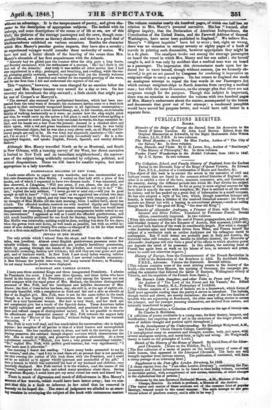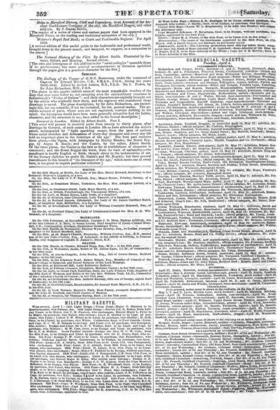PUBLICATIONS RECEIVED.
Boous.
Memoirs of the Reign of George the Second, from his Accession to the Death of Queen Caroline. By John Lord Hervey. Edited, from the Original Manuscript at Ickworth, by the Bight Honourable John Wilson Croker, LL.D., F.R.S. In two volumes. The Rival Beauties ; a NoveL By MISS Pardee, Author of" The City of the Sultan," Lee. In three volumes. Rose, Blonde, and 'Violet. By G. H. Lewes, Esq., Author of "Ranthorps,* "The History of Philosophy.," &c. In three volumes. Twelve Years' Wanderings na the British Colonies, from 1835 to 1847. By J. C. Byrne. In two volumes.
The Collegiate, School, and Family History of England, from the Earliest Period to the Eleventh Year of the Reign of Queen Victoria. By Edward Farr' F.S.A., Author of a Continuation of Home and Smollett, &c. [One object of this book is to correct the errors in the narrative of civil and military events that are found in the common school histories of England; an- other is to exhibit a view of the laws, manners, commerce, arts, and literature of the country, during the different periods into which Mr. Farr divides his subject for the purposes of this resume. So far as going to more original sources for his facts than is usually the cue with compilers Mr. Farr is entitled to all the credit he claims; and he has packed up a great deal of information in a small compass. He has also adopted a style of his own, which, though somewhat brusque and homely, is better than a dilution of the received historical manner: his views of matters are liberal but with a leaning to conventional phrases,—such as calling George the Third "the good old King,' "the dear old King."] Memoirs of Alexander Andryane, a Prisoner of State with Count Con- falonien and Silvio Felice. Translated by Fortunate Prandi. Second edition, considerably improved. In two volumes. [When this carious exhibition of the zeal of French propagandism, and the paltry, cold-blooded tyranny of the late Emperor of Austria, first appeared, (1838-40,) we noticed both features of the work at considerable length. Now what a change! —the Austrian spies and tribunals driven from Milan, and Vienna herself the subject of a revolution such as neither Andryane nor his colleagues dared to contemplate. But if such scenes are probably past in Italy and Austria, the historical value still remains; and, besides its intrinsic interest, the Memoirs of Alexander Andryane will ever form a proof of the effects to which absolute power can degrade the mind of its possessor. In this edition, the untiring hand of Prandi has again been at work on his labour of love, to retrench and prune, where he could not otherwise improve.] History of Europe, from the Commencement of the French Revelation in 1789 to the Restoration of the Bourbons in 1819. By Archibald Alleon, F.R.S.E., Advocate. Volume the Sixteenth. Seventh edition. [This volume contains some of the most stirring events in the history of the world,—the retreat from Moscow, the uprising of Germany, the campaign pre- ceding the armistice that followed the battle of Bautzen, Wellington's victory of Vittoria, and his expulsion of the French from Spain.] The Baron's Little Daughter, and other Tales in Prose and Verse. By the Author of" The Lord of the Forest and his Vassals," &c. Edited by William Greeley, MA., Prebendary of Lichfield.
[This volume consists of a series of ballads set in a framework, which forms of itself more agreeable reading than the poetry it serves to introduce. The
though varied and clever, are merely imitations: the story of the two families of invalids who are sojourning at Bonchurch, the elder ones telling stories to amuse the ydunger, and the younger amusing themselves, are derived from nature, and naturally transferred to paper.] Hours of Recreation; a Collection of Poems written to the age of twenty-ona. By Charles S. Middleton.
[A collection of poems creditable to a young man, for their fluency, imagery, and versification; but requiring more of art in the structure of the longer pieces, and more of definite thought and poetical spirit throughout.]
On the Development of the Understanding. By Hensleigh Wedgwood, A.M., late Fellowof Christ Church College, Cambridge. [A metaphysical essay on sensation and thought, number, body, and space, with several analogous subjects, and moralduty, or right and wrong. Mr. Wedgwood'a theory is based on the principles of Locke.] S7cetch of the History of the House of Russell. By David Ross, of the Leer'- pool (Notes on the Nobility, No. L) [The first collection of a series of papers on the family history of some of our noble houses, that appeared in the Liverpool Chronicle. The facts are well brought together from obvious sources. The publication, if continued, will form a cheap peerage of an informing kind.] Supplement to the Post-office London Directory, for 1848. [A cheap reprint from the " Yost-office London Directory "• containing the Par- liamentary and Postal information to be found in that IRA), volume, corrected to the latest period, with &supplement of new names, removals, or other changes in the alphabetical list of persons.] Sermons by the late Reverend Nathaniel Morren, A.AL, Minister of the First Charge, Bruhin. To which is prefixed, a Memoir of the Author. [The topics and matter of these sermons are of the common kind of popular theology, treated much in the usual manner. The style belongs to the pro- vincial school of platform oratory, and is able in its way.] Helps to Hereford History, Civil and Legendary; man Account of the An- cient Cordwainers Company of the city, the Mordiford Dragon, and other subjects. By .1. Dacres Devlin. [The reprint of a series of clever and various papers that have appeared in the Hereford Times, on the trading and traditional antiquities of the city.] Webster's Royal Red Bea; or Court and Fashionable Register. For April
• 1848. [A, revised edition of this useful guide to the fashionable and professional world, brought down to the present month, and designed, we suppose, as a companion to the season.]
The Natural History of the Flirt By Albert Smith. Illustrated by Ga-
' varni, Gilbert, and Henning. Second edition. [The cuts and letterpress of this addition to the "social zoOlogies" resemble those of its predecessors; but some musical accompaniments to flirtation sprinkled through the pages give it a practical character for the flirt.]
SBBIALS.
The Zoology of the Voyage of H.M.S. Semarang under the command of captain Sir Edward Belcher, C.B., F.G.S., during the years 1843-1846. Edited by Arthur Adams, R.N., F.L.S. No. I. Fishes, by Sir John Richardson, M.D., F.R.S. [The plates in this quarto exhibit some of the most remarkable wonders of the deep that ever came before is, not excepting even the extraordinary creatures in Schomburges "Fishes of Guiana": and their characters are capitally brought out by the artists who originally drew them, and the engraver who transferred those drawings to metal. The prose descriptions, by Sir John Richardson are exceed- ingly full, but too scientific, if not too technical, Tor the general reader. The ac- curate account of parts, whose uses are not explained, conveys nothing to his mind: the letterpress would have been more generally attractive had the habits, character, and the structure in use, been added to the formal description.] Cavarni in London. Edited by Albert Smith. Part I. [This serial will present in monthly parts from twenty to thirty plates, after drawings by Gavarni, of such scenes in London life as have attracted the artist's pencil, accompanied by "light sparkling essays, from the pens of authors whose social sketches and delineations of every-day character and every-day life hold an important place in the literature of the age." The first part contains three plates,—the Opera, with letterpress by Shirley Brooks; the Street Beg- gar' by Angus B. Reach; and the Casino, by the editor, Albert Smith. Of the three plates, the Casino is the best so far as truthfulness of character is concerned; and the Street Beggar the worst, from its want of nationality—the Mendicant is hardly English or Irish, though clever in the technicalities of art. Of the literary sketches we prefer Mr. Smith's and Mi. Reach's; but their general resemblance to this branch of "the literature of the age," which meets one at every turn, is too great to require particular criticism.]



























 Previous page
Previous page